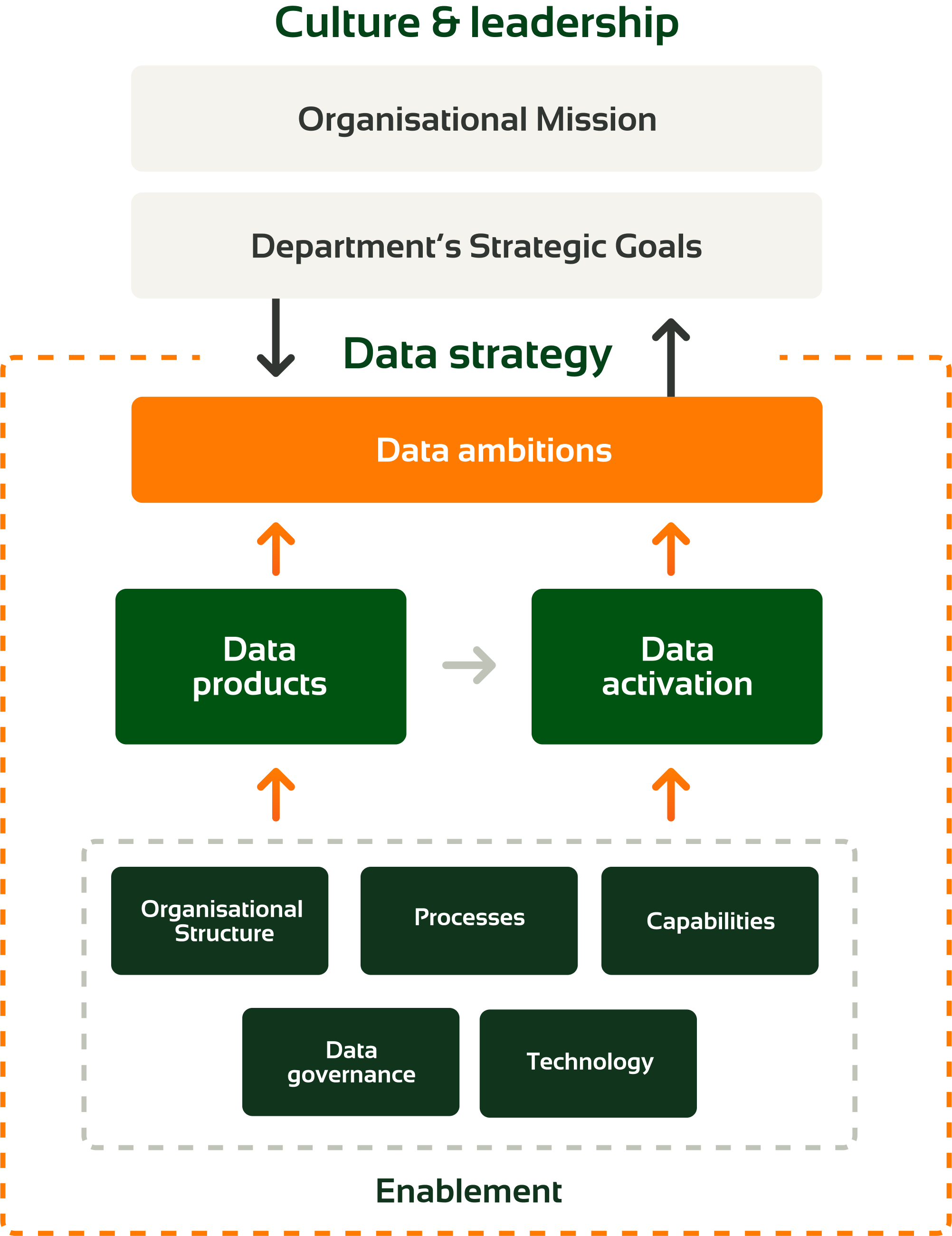Data strategy expert interview: data strategy from a holistic perspective
An interview with data strategy and research consultant Charlotte Vonkeman
- Article
- Data Strategy


Nowadays, almost every organisation is aware of the need to work data driven. They understand the importance, but few have managed to succesfully implement a data strategy. In this interview series we talk about the definition of data strategy, use cases, opportunities and tips from data strategy experts.

As a data strategy and research consultant, Charlotte sees that many organisations want to become more data-driven, but struggle to implement this in practice. They often resort to implementing a tool or creating a dashboard, while relevant factors in the organisation are often forgotten. These organisational factors are often crucial to the success of data-driven work. She shares her experiences and vision of data strategy.
What is your definition of data strategy?
It is a global plan with a roadmap in which you describe how you will optimally use your data to achieve your organisational goals. Your data strategy forms the guideline for moving from the current to the desired situation in terms of data within a certain time frame. It also contains the basic/strategic principles for collecting, storing, processing, and using data within the organisation.

The development of a data strategy begins with the goals and Key Performance Indicators (KPIs) of the organisation. These are translated into appropriate data ambitions: the ways in which data should contribute to the organisational goals. Then, you map out the current situation regarding data use. Here, you look beyond just data and tools. For example, how are data collection and use processes organised? Is data exchange and sharing between departments well-organised, or does the organisational structure hinder this (e.g. silo formation)? Is there enough and the right knowledge available among all employees to deal with data at all levels?
Then, you determine what the ideal situation for data use should look like. You also determine which steps you need to take to achieve the data ambitions. As such, you identify which parts of your organisation they affect. Once you have a clear picture, you know what needs to be changed in order to achieve your goals.
Formulating a data strategy alone is not enough; you still need to implement it. Meanwhile, the world is constantly changing. Therefore, a data strategy is not a static document that is 'finished' at some point. It should be a continuous cycle of formulating, implementing, evaluating, and optimising. You regularly check whether your ambitions still align with what you are doing. Have there been any market developments in the meantime that have an impact? This requires timely identification and course correcting.

In your experience, what is characteristic of social organisations that work data-driven?
Social organisations pose different, often more complex questions than commercial businesses. They don't ask "How can I increase revenue?" but, for example, "How can we use data to better guide the learning process of students?" When looking for answers to such questions, I always look beyond the data and technology. What can the organisation do with these insights? Which parts of the organisation does it impact? And what kind of answer are they looking for?
With a data-savvy organisation, you can work at a different level than with an organisation that scores low on data maturity. It always starts with thorough research into the current and desired situation.
Charlotte is currently supervising a data strategy project at a school community with 2000 employees and over 8000 students. She shares her practical experiences.
Can you tell us what a data strategy project looks like?
The schools within the school community that I supervise collect a lot of data. This includes the academic results of students, their attendance and development. There is also data from teachers, such as the format of their lessons. Additionally, there is data related to the school's management, such as HR, Marketing, and Finance. Furthermore, publicly available data on the social environment is also being used. This includes population development and competing school locations in the region.
Within the school community, there was a desire to do more with all this data, but there was no vision for this. Meanwhile, government agencies such as the Education Inspectorate increasingly expect schools and school communities to be able to substantiate their policy and results with data.
Traditionally, a school does not have the capacity to meet all of these expectations. Teachers and school management are already under pressure. Working in a data-driven manner can add value, but how do you implement it without increasing the workload? A pragmatic approach is essential in this context. This means that you should not always technically strive for the highest achievable goal, but rather look at what are realistic goals.

There is already a quality assurance cycle: a way to maintain control over the substantive quality of education. We have linked an analysis agenda to this, which provides each school with tools to perform relevant analyses at the right time throughout the school year. For each analysis, we provided an explanation: what can you do with it, how do you perform the analysis, and how do you interpret the results for your school? This provides practical tools for schools to extract value from data.
Download our data strategy e-book
Discover other insights from data strategy experts and learn how to maintain control and truly extract value from your data.

What challenges do you encounter in this process?
Each school has its own unique context. Therefore, each school needs its own (part-time) analyst who, together with the school management, can determine which data can help answer specific questions. However, this working method must be upheld centrally to prevent differences in definitions and approaches. That is why there is a data analyst who works centrally for the entire school community and regularly checks how things are going at the schools. This person organises the exchange of knowledge between schools, ensures cross-fertilisation, and holds walk-in consultation hours for specific topics. In time, this function can be expanded into a broader data team, in which different data expertise come together.
There are also many challenges when it comes to change management. Some people literally ask, 'Why on earth do I have to deal with data? I'm already so busy!' You then have to look for the added value that data can have for that person.
The organisation must widely communicate that data awareness and information-driven working are important themes. This must become part of the culture and the processes. If the board never asks the school management for data, why should they do anything with it? It doesn't feel urgent then.

It is therefore important that the leadership of the organisation communicates what role data will play in the organisation, and what the added value is. Why are we going to work more data-driven? Why are we investing time and energy in it? How does it fit in with the day-to-day of the people who have to work with it in their jobs? Concrete use cases help to get people excited about the possibilities. In addition, there is a lot of back and forth with people. They must feel heard and see that their feedback is taken seriously.
Which results can you already touch on?
The marketing department aims to attract new students to the schools. To achieve this, they need to know, for example, where the students come from, which schools they are currently attending, and pinpoint why some students do not select a particular school.
In order to provide marketing employees and schools with insight into this, we linked data from their own administration to public data from institutions such as the Education Executive Agency (In Dutch: Dienst Uitvoering Onderwijs, DUO). This data was visualised in a PowerBI dashboard. In this dashboard, you can see from which regions students come, which primary schools they attended, and what their school advice was for each school. You can also see how many students with the same school advice did not register at a specific school. Yearly trends and market developments can also be viewed in the dashboard.
For instance, the dashboard showed that there were many potentially interesting students at certain primary schools, while little recruitment was being done there. With this knowledge, those schools can tailor their marketing and PR efforts to schools with potential, for example by visiting them more often. It is important that they coordinate this with other schools within the school community. After all, you want to prevent everyone from fishing in the same pond.
The PR & marketing department now has relevant information that allows them to do their work better in less time. They can use their marketing resources more effectively in the right places.
What tips do you have for people who want to get started with their data strategy?
1. Start by thoroughly asking the "why" question.
What is the reason for it? And is everyone talking about the same thing?
2. Talk to as many people as possible, at all levels of the organisation, to see what the situation is really like.
This creates awareness of the project and support for you as a project leader. The subject comes to life, making people think more about it. This way, you will get more important information.
3. Listen to what people are saying, but also look at what they are doing.
What is documented and what actually happens often differ.
4. Ensure buy-in from management.
They need to truly get behind it and be willing to bear the consequences.
5. Adopt a holistic approach.
Don't just look at the data, tools, and their use. For example, find out how people deal with privacy issues. Do people who don't work directly with data have the same level of data awareness? Are they asking the right questions? And can they read dashboards?
6. Start with the department or team that is most advanced and feels the most urgency.
If you see that this works, you can roll it out to multiple departments. If there are already good examples that you can expand on, you can use them to speed things up.
7. Take a structured approach, for example, using Digital Power's data strategy model.
Start by linking your organisational or departmental goals to data ambitions. Then you can systematically look at the bottom products of the model. What data do we use? What products are available? Do these products align with what we want to do? What are the enablement factors? Why are dashboards not being used? Have the right KPIs been set? And do people know what to do? Analyse the current situation, the desired situation, and the path in between.

What opportunities are organisations missing out on if they don't do it?
In practice, I see that organisations engage in all sorts of data activities that do not contribute to their goals. For example, they want a Customer Data Platform because everyone else has one, or they include too much information in a dashboard, making it difficult for the user to see the forest for the trees.
Many things are created but not used, and a lot of work is done in vain. Here, organisations run a great risk that they do not use their data optimally to achieve their goals. This results in unexpected outcomes instead of being in control.

What is the current status of data strategy in the Netherlands according to you?
Most organisations do not have an explicit data strategy. It is a relatively new phenomenon. In practice, you need to ensure that you tie organisational goals to data ambitions. There is often a mismatch, resulting in the development of the wrong data products, or they are not being used. So there is still room for improvement.
How do you think the market for data strategy will develop?
There is increasing interest in the subject. More and more organisations are thinking about exactly what they want to do with their data and how they can approach it in a structured way. I hope that this will lead to the promise that data will make everything better truly being fulfilled.
I see the potential, but only the right people can ensure that things go in the right direction. These people are scarce. That is why Digital Power, as a data partner, is helping more and more companies to formulate and interpret their data strategy.
Stay informed about data strategy
This interview is part of a series about data strategy. Want to be informed when the next article has been published? Sign up for our email list and stay 'up to data':
This is an article by Marloes de Bruin, Marketing Manager at Digital Power
Marloes de Bruin is Marketing Manager at Digital Power. She is a strategic, all-round marketer, passionate about data-driven marketing. She writes on a variety of topics using input from our data consultants.
Marketing Managermarloes.debruin@digital-power.com










